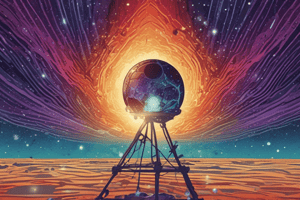Podcast
Questions and Answers
What is the fundamental event described by the Big Bang Theory?
What is the fundamental event described by the Big Bang Theory?
The Big Bang Theory describes the universe beginning as a hot, dense point that exploded approximately 13.7 billion years ago.
Describe the significance of the Planck Epoch in the context of the Big Bang theory.
Describe the significance of the Planck Epoch in the context of the Big Bang theory.
The Planck Epoch is significant because it represents the earliest stage when only energy existed, and the superforce was present.
What major developments occurred during the Inflationary Epoch?
What major developments occurred during the Inflationary Epoch?
During the Inflationary Epoch, the universe experienced rapid expansion from the size of an atom to the size of a grapefruit.
Explain the transition from the Quark Epoch to the Hadron Epoch.
Explain the transition from the Quark Epoch to the Hadron Epoch.
Signup and view all the answers
What is the defining characteristic of the Matter Era?
What is the defining characteristic of the Matter Era?
Signup and view all the answers
Describe the process of recombination during the Atomic Epoch.
Describe the process of recombination during the Atomic Epoch.
Signup and view all the answers
What role did gravitational forces play during the Galactic Epoch?
What role did gravitational forces play during the Galactic Epoch?
Signup and view all the answers
How did stars contribute to the formation of elements in the universe during the Stellar Epoch?
How did stars contribute to the formation of elements in the universe during the Stellar Epoch?
Signup and view all the answers
Signup and view all the answers
Study Notes
The Big Bang Theory
- The Big Bang theory is the most widely accepted explanation for the origin of the universe.
- It proposes that the universe began as a hot and infinitely dense point, only a few millimeters wide, similar to a supercharged black hole.
- This singularity exploded approximately 13.7 billion years ago, creating all matter, energy, space, and time.
The Radiation Era
- The radiation era dominated the universe's first tens of thousands of years.
- This era is characterized by smaller stages called epochs.
Planck Epoch
- The earliest stage of the radiation era.
- Only energy existed, along with the ancestor to the four forces of nature, the superforce.
- Gravity split away from the superforce at the end of this stage.
Grand Unification Epoch
- Marked by the remaining three unified forces of nature.
- This epoch concluded with the separation of the "strong" (or strong nuclear) force.
Inflationary Epoch
- The universe rapidly expanded from the size of an atom to the size of a grapefruit.
- It was extremely hot and filled with electrons, quarks, and other particles.
Electroweak Epoch
- The last two forces, electromagnetic and weak, finally split off.
Quark Epoch
- The universe contained all its essential ingredients but was too hot and dense for subatomic particles to form.
Hadron Epoch
- The universe cooled enough for quarks to bind together and form protons and neutrons.
Lepton and Nuclear Epochs
- The universe's final two stages of the radiation era.
- Protons and neutrons fused to create nuclei, leading to the formation of the first chemical element: helium.
The Matter Era
- Defined by the presence and dominance of matter in the universe.
- This era encompasses billions of years, including the present day.
Atomic Epoch
- The universe cooled enough for electrons to attach to nuclei for the first time.
- This process, called recombination, created the second element, hydrogen.
- Hydrogen and Helium atoms formed atomic clouds across the universe.
Galactic Epoch
- Pockets of gas within the clouds had enough gravity to collect atoms.
- These clusters became the seeds of galaxies.
Stellar Epoch
- Stars began forming within galaxies.
- This led to the formation of all other elements in the universe through the conversion of helium and hydrogen within stars.
- These elements, in turn, became the building blocks of planets, moons, life, and everything we see today.
Studying That Suits You
Use AI to generate personalized quizzes and flashcards to suit your learning preferences.
Description
Explore the fascinating concepts of the Big Bang Theory, which explains the universe's origin as a singularity that exploded over 13.7 billion years ago. Delve into the subsequent Radiation Era, highlighting significant epochs such as the Planck Epoch, Grand Unification Epoch, and Inflationary Epoch, which shaped the early universe's development.




